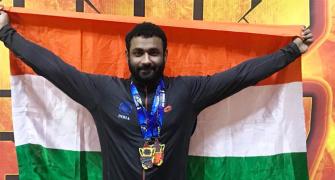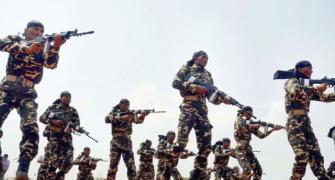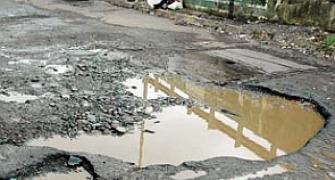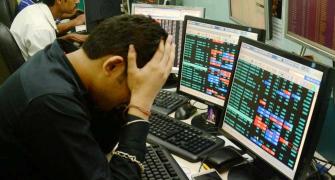A simple ritual started by a man who would have been alive today if we weren't such a callous society, says Veenu Sandhu.
Illustration: Uttam Ghosh/Rediff.com

The school bus arrived late one morning. As my daughter and three other children got on it, the other parent at the bus stop and I enquired about the delay. We assumed it was because of a traffic snarl on the route.
Early morning jams, after all, aren't unusual in Delhi. Though the bus was late, it would still make it in time for school and that's all that mattered.
As I looked to the driver, I expected to be greeted by a lively face and a cheerful "good morning".
The young man who had been ferrying our children to school for over a year wasn't like most other school bus drivers. Ordinarily, the drivers would wait silently till the children boarded the bus and would then pull away without a word.
With this fellow, it was different. He would wait to catch our eye and then greet us with a wide smile. This had become a ritual.
Sometimes he'd make a comment about the weather. Other times, he'd remark about the city's toxic pollution.
On days we were late and racing towards the bus, he would wait patiently. Leaning on the steering wheel, he'd signal to us to slow down.
"The bus will wait, don't run on the road. Roads are dangerous," he'd caution.
If we were repeatedly late, he would reproach us, half in jest. "Hmmmm, late again, haan?" he'd say, leaving us smiling sheepishly.
Inspired by him, the female bus guard, too, had started following the say-good-morning-with-a-smile routine.
Today, however, it wasn't that smiling face that greeted us from behind the wheel. Instead, there was a new driver, an older man.
As though reading the question on our faces, the bus guard said, "The other driver is dead. A bus rammed into his bike while he was waiting at a traffic signal."
The news left us stunned. As the bus drove away, I caught a glimpse of my daughter's face. She was looking at me, her expression blank.
I walked home numbly, and searched for news of the accident on the Internet. A speeding private bus hadn't braked at the traffic light and had crushed the driver and a conductor who were both on the bike.
Two more lives had been senselessly lost on Delhi's roads.
That evening I asked my daughter about the incident. She said she had already known about it, but hadn't told me because all it would have done was upset me.
"It wouldn't have changed anything," she said. I left it at that.
A few days later, we talked about it again. I wanted to know what she had felt when she first heard the news.
"People die on Delhi roads every day," she said. "But it wasn't apathy I felt, though it didn't affect me deeply either. It was something in between - an uncommon feeling about something that is so common."
A person she encountered five days a week had ceased to exist.
"He hadn't just stopped being our bus driver; he had stopped being altogether. And for what reason?" she said.
What struck me was that she had used the word "apathy". What does one say about a society that has normalised the occurrence of mindless deaths on the road even for children?
Last year, over 1,500 people died in road accidents in Delhi -- the highest anywhere in the country. Many of these deaths were caused by those who gave two hoots about traffic rules or about those who obeyed them.
In the last one year, 13 Delhi police personnel also died in the line of duty -- all of them in road accidents. They were mowed down on the way to work, or while patrolling the city's streets, or while riding to a crime location, or while trailing a suspect.
These were not deaths that resulted from a driver's error of judgement or due to some unforeseen circumstance. These were unjustifiable tragedies.
Back at the bus stop, the school bus arrived with the new driver at the wheel the next day. The children got in. We two parents who had come to see them off looked at the driver, hoping to catch his eye.
And when we did, we smiled and wished him a good morning. He smiled back, hesitatingly at first. And so it continued -- a simple ritual started by a man who would have been alive today if we weren't such a callous society.










